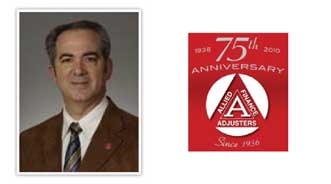Allied Finance Adjusters President Reflects on Changing Repo Landscape as 75th Anniversary Approaches

By subscribing, you agree to receive communications from Auto Remarketing and our partners in accordance with our Privacy Policy. We may share your information with select partners and sponsors who may contact you about their products and services. You may unsubscribe at any time.
ST. LOUIS –
Leaders of Allied Finance Adjusters are quick to point out that the last couple of years probably have created more change in the repossession industry than any of the previous 75 years.
With a mindset of bonding as a group, president George Badeen explained how this week’s convention is creating more enthusiasm and excitement.
“We’re very pleased to be honest so we’re having quite a big celebration in St. Louis. We’ve got a lot of people coming. It should be a really good convention this year,” Badeen told Auto Remarketing about Allied Finance Adjusters’ event that begins Wednesday and runs through the end of the week.
“The economy’s been tough and there hasn’t been a lot of auto financing the last couple of years so a lot of our members have seen some slowdowns in repossessions. I’m really surprised we’re getting such a good turnout,” Badeen continued.
The president is expecting about 360 repo agents and staff, along with representatives from 25 banks and financial institutions and a dozen credit unions, as well as 35 industry vendors.
“Everyone is to be excited to be there, meet some clients and learn some new things and see old friends,” Badeen insisted.
Subscribe to Auto Remarketing to stay informed and stay ahead.
By subscribing, you agree to receive communications from Auto Remarketing and our partners in accordance with our Privacy Policy. We may share your information with select partners and sponsors who may contact you about their products and services. You may unsubscribe at any time.
These learning opportunities have filled the convention agenda. One of the nation’s leading experts in skip-tracing — Alex Price, of MasterFiles — is scheduled to give a presentation, along with legal professionals from several law firms who plan to discuss how repo agents can limit liabilities and maintain compliance with state and federal guidelines.
As Allied Finance Adjusters gathers for its 75th national convention, Badeen reflected on how many new elements now influence how repo companies do business, ranging from license plate recognition technology to ways assignments are distributed.
“We’ve had the intervention of forwarding companies, which are basically like computer portals that send the accounts out for the banks. There have been a lot of problems with that type of business model,” Badeen stated.
Whether the assignment comes from a forwarding company or a more traditional way, Badeen mentioned how consumer-rights legislation and other behaviors debtors are exhibiting have made the process of recovering vehicles all the more challenging.
“Some people are hiding better today than they did in the past,” Badeen explained. “We used to track people where they had their phone, but you really can’t do that anymore with cell phones. The laws have changed of course. It’s made the skip-tracing part more difficult.
“We can’t even get half of the information say we got three or four years ago,” he added. “When you’re trying to skip trace an account you’re really limited. And the client sometimes can’t even give it to you depending on the contract. There are a lot of privacy issues that go on."
What the organization’s president believes is causing even more problems is the negative industry stereotypes that are being perpetuated by television shows that industry leaders think paint repossession in a negative light.
“They basically break the law and don’t really seem to follow any laws,” Badeen surmised about how programs such as Operation Repo unfold.
“They give an unprofessional look at the repossessor today. I think because of some of those reality shows they kind of create a violent atmosphere between the actual field agent and the debtor,” Badeen noted. “The debtor might be afraid because this is what he perceives as what the repo man is going to do. This has culminated in violent actions toward our agents throughout the country.”
Last month, a Florida agent was fatally shot and his colleague was severely wounded while attempting to pick up a vehicle. Violent crimes involving repossession have been reported in Mississippi, Michigan and other parts of the country, too.
“I think the violence has escalated a little bit more,” Badeen noticed. “It’s a trend if you will. It’s always been an inherently dangerous kind of job. I don’t think these reality shows are helping at all. They’re creating more violence if you will, and as an industry we’re really against that.
“As long as they’re making money and selling papers as they say, it’s going to be there. Bad news is always what people look at and read,” he continued to Auto Remarketing.
Despite the negative atmosphere, more regulation involving consumer protection and how agencies can recover collateral, Badeen emphasized that members of Allied Finance Adjusters work diligently for auto finance companies now — just like they have for 75 years.
“You go to (conventions and training sessions) and you get very motivated,” Badeen declared. “You talk to other guys and you compare notes and exchange ideas. In networking, you find out what works best for them and you come up with different plans to keep yourself evolving and moving forward.”


